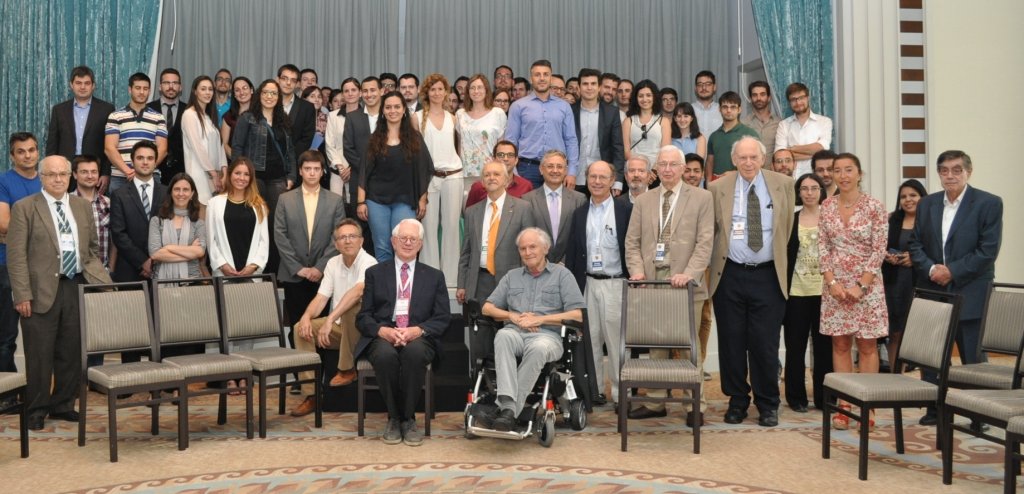Nine Nobel Prizes discussed with young researchers on climate change

Valencia.-2nd June. The Rey Jaime I awards took place in Valencia which promote investigation and scientific development in Spain through the help of scientific entities and business organizations. The most relevant feature of the Rey Jaime I is the excellence of their sworn every time that combine great number national and international personalities, among them several Nobel Prizes. His Majesty the King is the Honorary President. This year, part of the Jury of the awards was composed by 19 Nobel awards, including prominent figures in the field of climate change such as Professor Mario J. Molina, ozone layer discoverer. On this occasion, a discussion meeting was held, so that Nobel prizes could share their vision with young researchers.
The meeting was divided into 3 thematic groups: Economics, Biomedicine and Basic Sciences.
Out of the 19 Nobel Prizes belonging to the Jury, 9 of them attended the group discussion on Basic Sciences. Within it, it was remarkable the presence of Mario J. Molina, 1995 Chemistry Nobel and expert on Atmospheric Chemistry.
The Lead of the “Pioneers into Practice” (PiP) Climate-KIC programme, Jose L. Muñoz, the Head of Degradation and Soil Conservation CIDE-CSIC, Josephine Luis Rubio, some Valencian pioneers and some members of Climate-KIC Valencia joined to this group of Basic Sciences.
In this group, which was raised the need to keep investing in Basic Science and the importance of the multidisciplinary approaches, there was a reflection raised by Jose L. Muñoz, Lead of Climate-KIC PiP programme, “boosting social and technological innovation is essential to tackle the challenges associated with climate change, as well as the cooperation of all stakeholders and the training of multidisciplinary experts in order to set up products and services for society to face this challenge”.
Professor Mario J. Molina, Nobel Prize in Chemistry 1995, was optimistic and highlighted Europe as an example of leadership in the fight against climate change, although studies foresee an increase of 5 degrees by the end of the century. He encouraged the scientific community to work urgently on this struggle because before reaching a point of no return. He also reiterated that real change begins with changing our habits and style of life, despite having all the information available and the industry lobby playing against. If we do not assume climate change as a real own threat, and we do not educate people to make them aware we cannot deal with this challenge, asserting “the most dangerous thing is ignorance”.
[fusion_builder_container hundred_percent=”yes” overflow=”visible”][fusion_builder_row][fusion_builder_column type=”1_1″ background_position=”left top” background_color=”” border_size=”” border_color=”” border_style=”solid” spacing=”yes” background_image=”” background_repeat=”no-repeat” padding=”” margin_top=”0px” margin_bottom=”0px” class=”” id=”” animation_type=”” animation_speed=”0.3″ animation_direction=”left” hide_on_mobile=”no” center_content=”no” min_height=”none”]
Professor Jerome Friedman, Nobel Prize in Physics 1990, said that it is a social problem from the Western world and other societies dragging and as large populations like China, who want to follow our model and imitate our western style of life.
Professor Sheldon Lee Glashow, Nobel Prize in Physics in 1979, pointed out that “the man is holding one of the most exciting experiment in history! … We decided to unearth all the accumulated coal in the soil of the earth for millions years, fire it and wait to see what happens … ”
Likewise, Professor Edmond Fischer, Nobel Prize for Medicine in 1992, expressed his concerns about the water issue, which needs further investigation because it does not consider desalination as a good solution because of the contaminant component and the limited capacity for the population supply. That is why encouraging young researchers gathered there to “take up the challenge of science”, because “must be addressed because if not, it will mean life or death for the next 100 years.” In this regard, Professor Fischer said these young researchers “The beauty of science is that you never know where you end up.”
Coming back to climate change topic, Professor Molina was convinced that science and economics must communicate closely each other setting out measures to raise fees to bring CO2 emissions down. Thus, the proceeds, but for the final user, far to be a drawback, could be used by governments to invest in more sustainable transport and infrastructure, making it more attractive for citizens to use public transport and other more sustainable services.[/fusion_builder_column][/fusion_builder_row][/fusion_builder_container]

